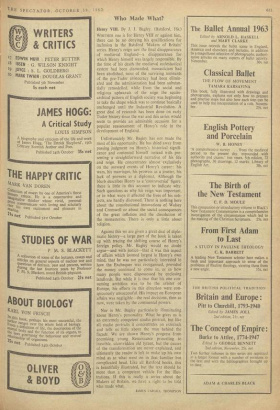Who Made What?
Henry VIII. By J. J. Bagley. (Batsford, 16s.) WHETHER one is for Henry VIII or against him, there can be no denying his qualifications for inclusion in the Batsford 'Makers of Britain' series. Henry's reign saw the final disappearance of medieval England--a disappearance for which Henry himself was largely responsible. By the time of his death the medieval ecclesiastical system had been dismantled, monasticism had been abolished, most of the surviving remnants of the pre-Tudor aristocracy had been elimin- ated and the administration had been substan- tially remodelled, while from the social and religious upheavals of the reign the squire- archical pattern of English society was beginning to take the shape which was to continue basically unchanged until the Industrial Revolution. A great deal of research has been done on early Tudor history since the war and this series would seem to provide an admirable occasion for a popular reassessment of Henry's role in the development of England. Unfortunately Mr. Bagley has not made the most of his opportunity. He has shied away from passing judgment on Henry's historical signifi- cance and contented himself instead with pre- senting a straightforward narrative of his life and reign. He concentrates almost exclusively on the outward events of Henry's career: his wars, his marriages, his prowess as a jouster, his lack of prowess as a diplomat. Although the blurb describes Henry as a 'controversial' figure, there is little in this account to indicate why. Such questions as why his reign was important, or in what ways it affected the lives of his sub- jects, are hardly discussed. There is nothing here about the constitutional innovations of Wolsey and Cromwell or about the social consequences of the great inflation and the dissolution of the monasteries. There is only a little about religion. Against this we are given a great deal of diplo- matic history—a large part of the book is taken up with tracing the shifting course of Henry's foreign policy. Mr. Bagley would no doubt argue—and with justice that it was this aspect of affairs which loomed largest in Henry's own mind, that he was not particularly interested in how the Exchequer was reorganised, provided the money continued to come in, or in how many people were dispossessed by enclosing landlords. But while it is true that his one con- suming ambition was to be the arbiter of Europe, his efforts in this direction were con- spicuously unsuccessful. His impact on European affairs was negligible —the real decisions, then as now, were taken by the continental powers. Nor is Mr. Bagley particularly illuminating about Henry's personality. What he gives us is an extremely competent studio portrait, but like all studio portraits it concentrates on externals and tells us little about the man behind the façade. We are shown Henry's progress from promising young Renaissance princeling to irascible, ulcer-ridden old tyrant, but the causes of the transformation arc never explained, and ultimately the reader is left to make up his own mind as to what went on in that familiar but complicated head. Like all Batsford books, this is beautifully illustrated, but the text should be more than a competent vehicle for the illus- trations. If this is really a series about the Makers of Britain, we have a right to be told who made what.
JAMES CARGILL THOMPSON














































 Previous page
Previous page